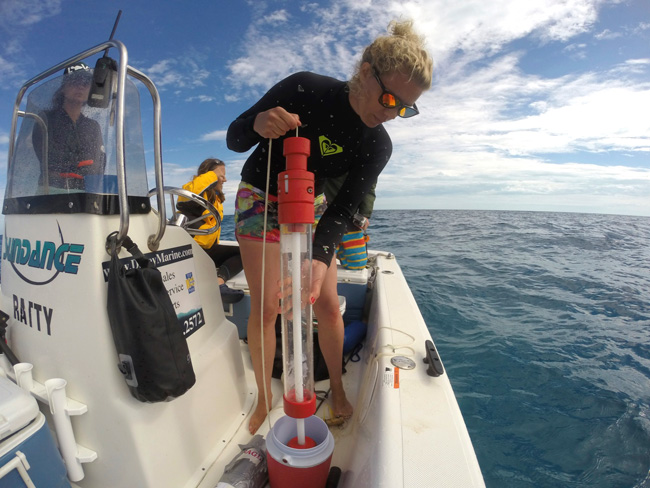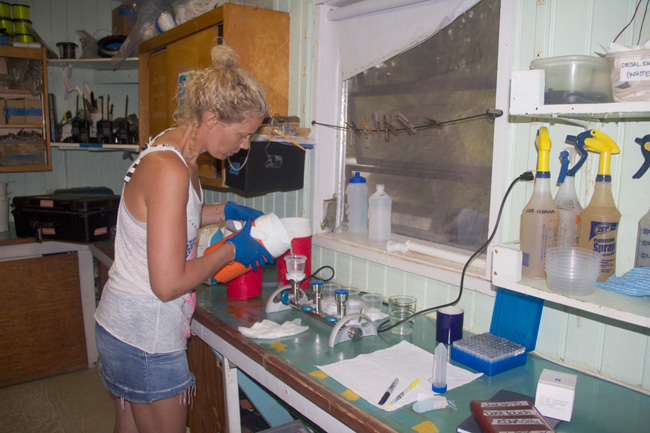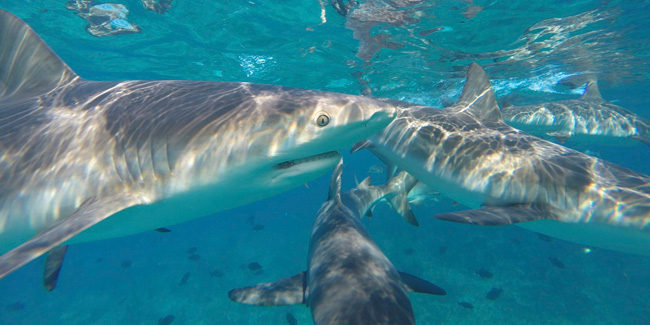
Judith Bakker collecting samples
|
Can we use environmental DNA to investigate shark
populations?
Judith Bakker, a Ph.D. candidate at Salford University in
Manchester, England, was conducting shark research in The Bahamas last week
with support from the Bimini Biological Field Station, often referred to as the
Sharklab.
Bakker is developing methods for scientists to be able to
collect environmental DNA, or eDNA, and to test it for the presence of shark
species.
The study is funded by The Pew Charitable Trusts, the
Washington, D.C.-based non-government organization that worked closely with The
Bahamas National Trust and the government to create a shark sanctuary in
Bahamian waters in 2011.
eDNA is made up of DNA shed by animals and anything else
that lives in the sea, this DNA can be either free-floating or bound to
particulate matter found in the water column.
“We should be able to detect tiny bits of shark eDNA that
have been released from their feces poop, urine, blood, semen, mucus or skin
cells or other tissues,” explains Bakker.
The scientist collects several gallons of water from
different types of habitats including mangroves, deep water, the Gulf Stream,
and at popular shark dive sites around Bimini.

Judith Bakker at work
|
She then takes the water
samples back to the lab where she runs them through a two filter using a vacuum
pump. Filters with two different pore
sizes are used, which capture anything in the water larger than 0.22 and 0.45 micrometers,
respectively. This is about the size
needed to capture the eDNA. Once she
collects the eDNA on the filter, she extracts the DNA, which is then sequenced to
test for the presence of sharks. Like
all living creatures, sharks have DNA codes unique to every species.
“Bimini is a very sharky place,” says Bakker. “If these
techniques are going to work, this is the place where we are most likely to get
positive results. We know that there are sharks in the water here, we just have
to prove that we can detect their DNA in the water.”
“The Bahamas has taken many steps to protect sharks, and
this is one of the main reasons I chose to conduct my research here,” said
Bakker. “I hope that other countries do
the same and create shark sanctuaries before we lose some species forever.”
Angelo Villagomez, manager of Pew’s global shark
conservation campaign, accompanied Bakker during her data collection.
“This is ground-breaking work,” said Villagomez. “As this
technology develops, two or three down the road, we could have the ability to
test for the presence of shark species just by using a water sample. We might even be able to test for
density. This could have implications
for conservation and management of sharks and other species.”
Bakker has previously collected eDNA samples in Belize
and Jamaica. After leaving Bimini she
went to Turks & Caicos Islands to collect samples. She is returning to Manchester in March to
test her samples and will have her preliminary results during the spring.
Villagomez and Bakker are hopeful that she will show that
the technology is feasible.
“It’s just a hypothesis, of course,” said
Villagomez. “But Judith has already
successfully collected samples and had positive test results from shark eDNA
extraction conducted at an aquarium, so it looks encouraging that she will prove
it true.”

Caribbean reef sharks
|
